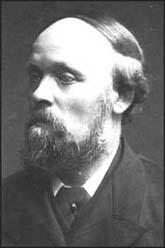George Howell

George Howell, the eldest of eight children, was born in Wrington, Somerset, on 5th October 1833. His father owned a small general builders but found it difficult to find enough work to support his family. At the age of twelve Howell left his Church of England school in Bristol and started work with his father. After a period as a mortar-boy he became a bricklayer. He worked a twelve hour day but used his Sundays for reading. Early favourites included Foxe's Book of Martyrs and Bunyan's Pilgrim's Progress.
Howell disliked the heavy work of the building trade and found employment as an apprentice shoemaker. Several of the men held radical political views who were active Chartists. They introduced him to the newspapers such as the Northern Star and the Red Republican and in 1848 Howell joined the Chartist movement.
Several of the shoemakers were also Methodists and Howell was persuaded to attend meetings at the Wrington Chapel. Howell was converted and became a lay preacher. He also became an active member of the local Temperance Society.
In 1854 George Howell moved to London. Unable to find work as a shoemaker, he returned to his former trade of bricklaying. Howell attended a large number of political meetings where he met Karl Marx, George Holyoake, Charles Bradlaugh and Frederic Harrison.
Howell joined the Operative Bricklayers' Society and in 1859 became involved in an industrial dispute over demands for a nine-hour day. Howell joined the strike committee and soon emerged along with Robert Applegarth and George Potter as one of the main leaders of the union. As a result of his union activities he was blacklisted and for the next five years found it impossible to work as a bricklayer.
In 1861 he was elected to the executive of the London Trades Council and soon afterwards became its secretary. A strong supporter of universal suffrage, in 1865 Howell became full-time Secretary of the Reform League. Howell organised massive demonstrations in London in 1866 and 1867 and played an important role in persuading Benjamin Disraeli and his Conservative government to pass the 1867 Reform Act.
Disappointed by the scale of this reform, Howell continued to campaign for universal suffrage. He retained his involvement in the trade union movement and in 1871 was appointed as Secretary of the newly established Trade Union Congress. In the 1870s he also contributed regularly to The Bee-Hive and published several books on trade unionism including A Handy Book of the Labour Laws (1876), Conflicts of Capital and Labour (1878), Trade Unionism New and Old (1891) and Labour Legislation, Labour Movements and Labour Leaders (1902).
Howell tried several times to be elected to the House of Commons. He failed in the the general elections of 1868, 1874 and 1881 but was finally won as the Lib-Lab candidate in Bethnal Green in 1885. One of Howell's main achievements in Parliament was helping the passing of the Merchant Shipping Bill that improved the working conditions of merchant seamen. Howell successfully defending his Bethnal Green seat in 1886 and 1892 but was defeated by the Conservative candidate in the 1895 General Election.
In poor health, Howell retired from public life. His friend, Robert Applegarth and the Trade Union Congress raised a £1650 testimonial to buy him an annuity.
George Howell on 16th September, 1910.
